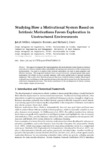Studying How a Motivational System Based on Intrinsic Motivations Favors Exploration in Unstructured Environments
Title
Studying How a Motivational System Based on Intrinsic Motivations Favors Exploration in Unstructured EnvironmentsDate
2024Abstract
This paper investigates the implementation of a motivational system based on intrinsic motivation in robots to enhance their adaptability in learning new processes within unstructured environments. Our goal is to explore how intrinsic motivation can lead to more adaptive and effective learning. The proposed methods focus on goal discovery and perceptual state space exploration, for which we use a novelty measure with some added noise to prevent learning stagnation. The results show that the proposed discovery methods achieve similar effectiveness in identifying novel features in the perceptual state as the algorithms tested from the literature but with lower computational times. This study contributes to the development of robotic systems with a higher degree of autonomy.
Keywords
System Random Network Distillation (RND)
Dynamic Auto-Encoder (Dynamic-AE)
Episodic Curiosity Module (ECO)
EX2 (Exploration by Extrapolation)
Robot
Dynamic Auto-Encoder (Dynamic-AE)
Episodic Curiosity Module (ECO)
EX2 (Exploration by Extrapolation)
Robot
Editor version
Rights
Atribución 4.0







